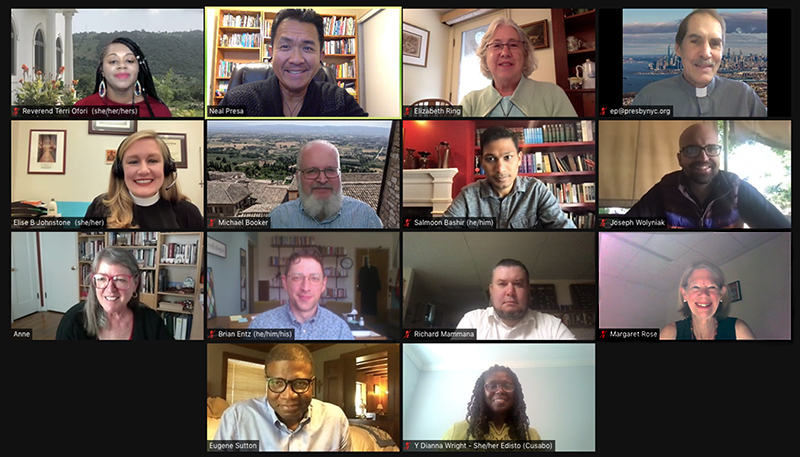
From the Episcopal Church: The Rt. Rev. Eugene Sutton (co-chair), the Rev. Canon Elise B. Johnstone (co-vice chair), Dr. Michael Booker, the Rev. Dr. Joseph Wolyniak and Ms. Elizabeth Barker Ring. The Rev. Margaret Rose and Mr. Richard Mammana served as staff. Mr. Salmoon Bashir served as staff intern. From the Presbyterian Church (U.S.A.): Ruling Elder Dr. Anne Wainstein Bond (co-chair), the Rev. Dr. Neal D. Presa (co-vice chair), the Rev. Terri Ofori, the Rev. Brian Entz, the Rev. Robert Foltz-Morrison and the Rev. Dr. Christian Boyd. Ruling Elder Dr. Dianna Wright served as staff.

From the Episcopal Church: The Rt. Rev. Eugene Sutton (co-chair), the Rev. Canon Elise B. Johnstone (co-vice chair), Dr. Michael Booker, the Rev. Dr. Joseph Wolyniak and Elizabeth Barker Ring. The Rev. Margaret Rose and Richard Mammana served as staff. Salmoon Bashir served as staff intern. From the Presbyterian Church (U.S.A.): Ruling Elder Dr. Anne Wainstein Bond (co-chair), the Rev. Dr. Neal D. Presa (co-vice chair), the Rev. Terri Ofori, the Rev. Brian Entz, the Rev. Dr. Robert Foltz-Morrison and the Rev. Dr. Christian Boyd. Ruling Elder Dr. Dianna Wright served as staff.
Worship, prayer, and deep conversation around church membership and other issues made up the third round of the Bilateral Dialogue between the Presbyterian Church (U.S.A.) and the Episcopal Church. Representatives from each denomination recently met virtually to continue discussing ways that the churches can work together.
Eight representatives from each church met for two days to discuss a number of issues facing Christian denominations, including declining membership and the impact of the COVID-19 pandemic on in-person worship. Many churches now offer online worship for those who are unable to or don’t participate in person.
“We’re realizing in these days of Zoom that there are more members online than those coming into the churches themselves and those people won’t be connected to church if we move away from Zoom,” said Dr. Dianna Wright, director of Ecumenical and Interreligious Relations with the Office of the General Assembly. “What does it mean to be a member of the church now?”
Since 2000, the two denominations have been conducting Bilateral Dialogue in an effort to deepen ties and work together. Church membership has been one of the ongoing topics.
“What is meant by ‘church membership’ in our 21st century North American contexts is something that churches are grappling with when there is fluidity of what it means to be committed to a particular community and how commitment has been understood,” observed the Rev. Dr. Neal D. Presa, co-vice chair of the Episcopal-Presbyterian Bilateral Dialogue and a member of the PC(USA) delegation. “The Bilateral Dialogue carefully reflected on our respective churches’ understanding and approaches to church membership and how churches, generally, and our communions, specifically, must adapt to present-future realities in a peri-/post-COVID time, and where present-future generations express commitment — with their hands/feet, hearts and finances — when communities make real impact in the world to address the enormity of racial injustice, gender injustice, climate change, poverty, violence and so much more.”
“Despite the differences in the polities of TEC and PC(USA) as regards membership, we came together around the table as the visible signs of our faith communities. As we all affirm that our ‘core’ membership is as members of the Body of Christ, we agree that our commonalities are stronger than our differences,” said Ruling Elder Dr. Anne Wainstein Bond, Presbyterian co-chair. “I am personally very excited to continue exploring these topics as we continue our work in the Dialogue.”
The group spent time in discussion on Professor Amy Plantinga Pauw’s book “Church in Ordinary Time: A Wisdom Ecclesiology.” In the book, Pauw asserts that the church as a post-resurrection community lives in the in-between, accompanies the hurt of the world in its creaturehood, and continually grows in wholeness and maturity, lacking historical closure. The group also reflected on the church being one, holy, catholic and apostolic, and how those marks are present in the church today.
“We’re realizing that some of our polity can block the church from being the church or hold the church back because we’re so focused on making sure we stay close to our polity,” said Wright. “We’ve been looking at practical ways of changing that. In the future, the church will need to find ways to not be so rigid and closed-in, checking all of the boxes.”
The Dialogue Table is slated to gather again in Austin, Texas, Feb. 21–23, 2022, or by Zoom, depending on COVID-19 protocols. The focus of that meeting will be on questions and realities of racial justice and socioeconomic class in the histories, polities and theologies of both churches. The group says that it is looking forward to reviewing the churches’ response to its draft report submitted for GA225.
“The Bilateral Dialogue looked with excitement and anticipation as we prepare a proposal for limited exchange of ordered ministries to the General Convention and General Assembly of the Episcopal Church and PC(USA), respectively, next summer for further comment,” said Presa. “Our hope is that after comments and suggestions are received, we will be in a position to transmit a final proposal to our respective national legislative bodies in 2024 that will bring our two communions closer together in both our theologies and practices of ordained ministries at the congregational/parish levels that respects and honors our distinctive polities.”
